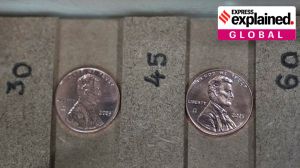NSE moves CAT against CCI order
CCI has directed NSE to put in place system that would allow brokers choice to select any software for trading.
Country’s top stock exchange NSE on Thursday approached the Competition Appellate Tribunal (Compat) against a CCI order that pronounced it guilty of abusing market dominance and imposed a Rs 55.5 crore fine on the the bourse.
In its appeal before Compat,NSE has asserted that the Competition Act did not envisage low price,which is not predatory,as an abuse of dominance,sources said.
NSE has further told the tribunal that the order from CCI (Competition Commission of India) was “antithetical” or contradictory to the principal purpose of the Competition Act,which was to protect and promote consumer welfare. In its order dated June 23,CCI had imposed Rs 55.5 crore fine on National Stock Exchange (NSE) for abusing its dominant market position and asked the bourse to stop unfair trade practices like subsidising its services with a zero-price regime in currency derivatives segment.
Imposing a penalty equivalent to five per cent of the bourse’s three-year average turnover,CCI had said that there was “a clear intention on the part of NSE to eliminate competitors in the relevant market.”
The CCI order followed months-long probe by it into the matter after a complaint from NSE’s younger rival MCX-SX.
NSE has sought relief from Compat on payment of penalty of Rs 55.5 crore,as also from the requirement of maintaining segmented accounts and from any compensation claims that might be filed by MCX-SX or any other third party.
After the CCI order,MCX-SX had said it would look at claiming compensation for the losses and damages suffered by it due to NSE’s anti-competition business practices. While MCX-SX did not quantify the compensation to be sought,sources pegged the claims at Rs 400-450 crore,including Rs 150 crore of losses suffered by the exchange in currency derivatives business due to NSE’s zero-pricing.
In its appeal before Compat,NSE said it was forced to announce charges in currency derivatives segment after the CCI order and there were indications that its two rivals,MCX-SX and United Stock Exchange,would also levy charges.
The move has already resulted in significant drop in trading volumes in CD segment to the detriment of consumers,NSE has asserted.
The NSE has further said that it has consistently been number two in the currency derivatives (CD) market and zero-pricing strategy has developed the market,which was evident from increase in trading volumes.
NSE announced last week that it will start levying charges for currency derivatives trading from August 22.NSE said it had waived the charges for the benefit of the
market and the consumers,and all market players,including exchanges,members and consumers,have benefited from the move.
The NSE commenced currency derivatives trading on August 29,2009,becoming the first bourse to offer this product. However,it has not levied any charge for this till now.
Trading in currency futures segment has seen a rapid growth ever since its launch and the daily average trading volume has crossed Rs 18,000 crore,from a turnover of Rs 291crore on the first day of trading on August 29,2009.
NSE had said it has decided to levy the transaction charges “in deference to the order of the Competition Commission of India against NSE and without prejudice to the rights and contentions of the Exchange in the matter.”
Besides turnover-based transaction charges of up to Rs 1.15 per lakh in currency futures and of up to Rs 40 per lakh in options market,NSE has also asked its members to contribute for its Investor Protection Fund Trust.
NSE would levy an advance transaction charge of Rs 50,000 per member per annum and would charge admission fee of Rs one lakh for its existing members and Rs five lakh for others.
MCX-SX and another player in the market USE are expected to soon take a call on levy of transaction charges. MCX-SX has been saying so far that it was not being able to levy a charge despite suffering huge business losses,as NSE was not charging for the product.
NSE is believed to have further said that the charge against it that the bourse was leveraging its dominance in equity and other segments for its benefit in currency market,had no basis either in facts or laws.
On another matter concerning the trading software solution ODIN,NSE said that the CCI passed a judgement despite the matter being subject matter of a court dispute at that time being heard by the Bombay High Court.
In its order,CCI had also directed NSE to put in place a system that would allow brokers a choice to select any software for trading,including ODIN,on the NSE platform.
According to the CCI,NSE’s conduct in refusing to share Application Programme Interface Code (APIC) with ODIN and putting FTIL on watch list was an “exclusionary conduct”.
The APIC would allow the ODIN users to connect to the NSE trading platform through their preferred mode. The dispute has now been settled by the two parties,NSE and FTIL,a promoter entity of MCX-SX,under which NSE has agreed to allow brokers to use FTIL’s ODIN software in currency derivatives market subject to certain conditions.
These conditions include FTIL agreeing to allow NSE to conduct inspection of the software to its satisfaction. NSE said this vindicates its position that it had earlier prohibited FTIL on account of issues related to their
software.
The dispute dates back to 2008,when NSE had put FTIL’s trading and risk management system software ODIN on ‘watch list’ after alleging it to have bugs and various other issues.
At that time,ODIN used to command about 80 per cent market share in Indian market as a vast majority of brokerage houses were using this trading platform.
However,ending their long-running dispute in this matter,NSE and FTIL reached a settlement earlier this month.As part of the consent terms,NSE has agreed to remove ‘FTIL-ODIN’ from its Watch-List with immediate effect and has also agreed to FTIL the Application Protocol Interface (API) for the currency market segment. As per the settlement,NSE will “grant approvals in respect of new services/products of FTIL,subject to completion of pre-described requirements as agreed and FTIL shall co-operate with NSE for the same”.



- 01
- 02
- 03
- 04
- 05




























